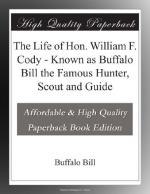The next morning the command got an early start and traveled thirty miles to Saline River, where they made their last camp on the plains. As some of the party were attacking a herd of buffaloes, I rode in from Fort Hays and got into the middle of the herd, and killed a buffalo or two before the hunters observed me. I brought a large number of letters, which proved welcome reading matter.
In the evening we gathered around the camp-fire for the last time. The duty of naming the camp, which was called Camp Davies, having been duly performed, we all united in making that night the pleasantest of all that we had spent together. We had eloquent speeches, songs, and interesting anecdotes. I was called upon, and entertained the gentlemen with some lively Indian stories.
The excursionists reached Fort Hays, distant fifteen miles, on the morning of October 2d, where we pitched our tents for the last time, and named the camp in honor of Mr. Hecksher. That same afternoon General Sheridan and his guests took the train for the East, after bidding Major Browa, Lieutenant Hayes and myself a hearty good-bye, and expressing themselves as greatly pleased with their hunt, and the manner in which they had been escorted and guided.
It will be proper and fair to state here that General Davies afterwards wrote an interesting account of this hunt and published it in a neat volume of sixty-eight pages, under the title of “Ten Days on the Plains.” I would have inserted the volume bodily in this book, were it not for the fact that the General has spoken in a rather too complimentary manner of me. However, I have taken the liberty in this chapter to condense from the little volume, and in some places I have used the identical language of General Davies without quoting the same; in fact, to do the General justice, I ought to close this chapter with several lines of quotation marks to be pretty generally distributed by the reader throughout my account of our ten days’ hunt.
Soon after the departure of General Sheridan’s party, we returned to Fort McPherson and found General Carr about to start out on a twenty days’ scout, not so much for the purpose of finding Indians, but more for the object of taking some friends on a hunt. His guests were a couple of Englishmen,—whose names I cannot now remember—and Mr. McCarthy, of Syracuse, New York, who was a relative of General Emory. The command consisted of three companies of the Fifth Cavalry, one company of Pawnee Indians, and twenty-five wagons. Of course I was called on to accompany the expedition.




